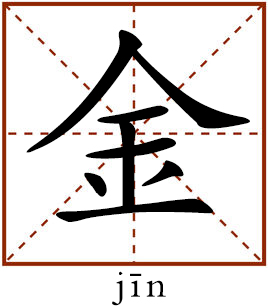Gold

This character refers to gold, money or wealth. It is also used to describe things that are precious. For example, the old saying, “An inch of time is an inch of gold,” stresses the importance and value of time.
锲而不舍,金石可镂
qiè ér bù shě, jīn shí kě lòu
Qie er bu she refers to constant chiseling or carving. Jin shi means gold and stone. Ke lou means to be able to inscribe or engrave. The term usually indicates that sticking to something with persistence leads to success.
This term originated from the Xunzi by Xunzi (c. 313–238 BCE), a famous Confucian scholar of the pre-Qin times (before 221 BCE). In his book, Xunzi wrote, “If you start carving but give up, you cannot cut even a rotting piece of wood in two. Yet if you carve away and never give up, even metal and stone can be engraved.” His words indicate that without a strong mind and the virtue of persistence and patience, one achieves nothing. Instead, if one continues to attempt something, even the hardest task can be tackled. Nowadays, this phrase is often used to tell people to be determined and persevere in their aims despite difficulties.
金戈铁马
jīn gē tiě mǎ
Jin refers to shimmer and ge is the dagger-axe, a type of pole weapon used in ancient China. Tie is iron and ma refers to horses. This proverb often serves as a description of heroic, brave and inspiring soldiers or warriors in battle.
This proverb comes from a poem by the great Chinese poet and military leader during the Southern Song Dynasty, Xin Qiji (1140–1207). In the poem, the “Joy of Eternal Union” (“Yong Yu Le”), Xin wrote, “With a corps arm’d with sharp dagger-axes./ And armour’d steeds, he shock’d th’ land in his reign.” During Xin’s lifetime, northern China was occupied by the Jurchens of the Jin Dynasty during the Ji-Song Wars. The suffering of the Song gave Xin a sense of patriotism and he started seeking revenge against the invading Jurchens. The verses quoted above show Xin reminiscing about the victorious campaigns of Emperor Wu of (Liu) Song (363–422) against the northern kingdoms. This proverb usually strikes a patriotic note and highlights the courage and willingness to defend one’s homeland.
(edited by REN GUANHONG)
